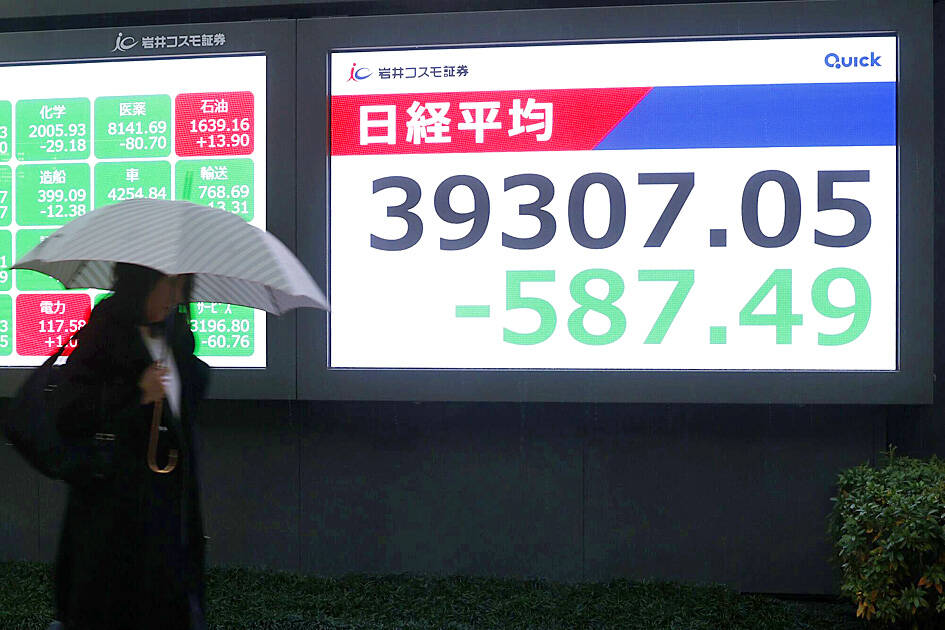Bank of Japan (BOJ) Governor Kazuo Ueda yesterday sent a fresh reminder to bankers that he is going to raise the benchmark rate if the economy continues to improve this year.
“Our stance is that we will raise the policy interest rate to adjust the degree of monetary easing if economic and price conditions keep improving,” Ueda said in his first public speech this year.
The governor spoke briefly at a new year conference held by the Japanese Bankers Association in Tokyo.

Photo: Bloomberg
Ueda’s reiteration of his existing stance comes as central bank watchers seek clues over whether the bank would raise rates this month or in March.
The governor kept his options open on the timing of the next rate hike by saying that it would depend on the economy, inflation and financial conditions.
The BOJ held its benchmark rate at 0.25 percent last month.
The summary of opinions for last month’s gathering hinted that some board members saw a need to increase borrowing costs sooner rather than later.
Ueda’s comments yesterday underscore that the central bank might be moving rates this month, while it could still choose to wait it out depending on circumstances. That uncertainty has kept the yen at a relatively weak level.
The yen held its losses after Ueda spoke, following its drop of as much as 0.4 percent to ¥157.83 against the US dollar yesterday morning.
Japan’s five-year government bond yield climbed to its highest level since 2009 and the 10-year yield rose to its peak since 2011 amid elevated US long-term yields and speculation that the BOJ would hike interest rates.
The BOJ ended its massive monetary stimulus program, including the world’s last negative interest rate, in March last year.
The central bank is set to hold its next policy meeting between Jan. 23 and 24. There is no scheduled public speech by Ueda before then, although BOJ Deputy Governor Ryozo Himino is set to give a speech and attend a news conference on Tuesday next week. That event is expected to draw close market attention for any further clues over a rate hike this month.

In Italy’s storied gold-making hubs, jewelers are reworking their designs to trim gold content as they race to blunt the effect of record prices and appeal to shoppers watching their budgets. Gold prices hit a record high on Thursday, surging near US$5,600 an ounce, more than double a year ago as geopolitical concerns and jitters over trade pushed investors toward the safe-haven asset. The rally is putting undue pressure on small artisans as they face mounting demands from customers, including international brands, to produce cheaper items, from signature pieces to wedding rings, according to interviews with four independent jewelers in Italy’s main

Japanese Prime Minister Sanae Takaichi has talked up the benefits of a weaker yen in a campaign speech, adopting a tone at odds with her finance ministry, which has refused to rule out any options to counter excessive foreign exchange volatility. Takaichi later softened her stance, saying she did not have a preference for the yen’s direction. “People say the weak yen is bad right now, but for export industries, it’s a major opportunity,” Takaichi said on Saturday at a rally for Liberal Democratic Party candidate Daishiro Yamagiwa in Kanagawa Prefecture ahead of a snap election on Sunday. “Whether it’s selling food or

CONCERNS: Tech companies investing in AI businesses that purchase their products have raised questions among investors that they are artificially propping up demand Nvidia Corp chief executive officer Jensen Huang (黃仁勳) on Saturday said that the company would be participating in OpenAI’s latest funding round, describing it as potentially “the largest investment we’ve ever made.” “We will invest a great deal of money,” Huang told reporters while visiting Taipei. “I believe in OpenAI. The work that they do is incredible. They’re one of the most consequential companies of our time.” Huang did not say exactly how much Nvidia might contribute, but described the investment as “huge.” “Let Sam announce how much he’s going to raise — it’s for him to decide,” Huang said, referring to OpenAI

The global server market is expected to grow 12.8 percent annually this year, with artificial intelligence (AI) servers projected to account for 16.5 percent, driven by continued investment in AI infrastructure by major cloud service providers (CSPs), market researcher TrendForce Corp (集邦科技) said yesterday. Global AI server shipments this year are expected to increase 28 percent year-on-year to more than 2.7 million units, driven by sustained demand from CSPs and government sovereign cloud projects, TrendForce analyst Frank Kung (龔明德) told the Taipei Times. Demand for GPU-based AI servers, including Nvidia Corp’s GB and Vera Rubin rack systems, is expected to remain high,